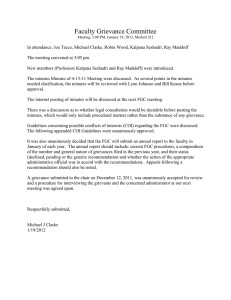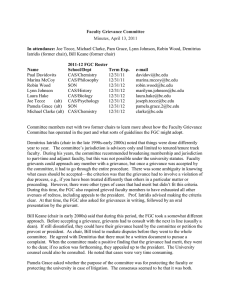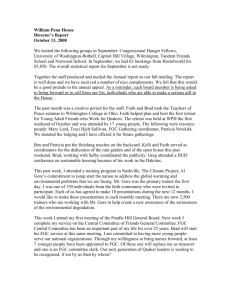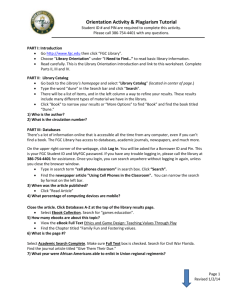Faculty Grievance Committee 2011-2012 Annual Report
advertisement
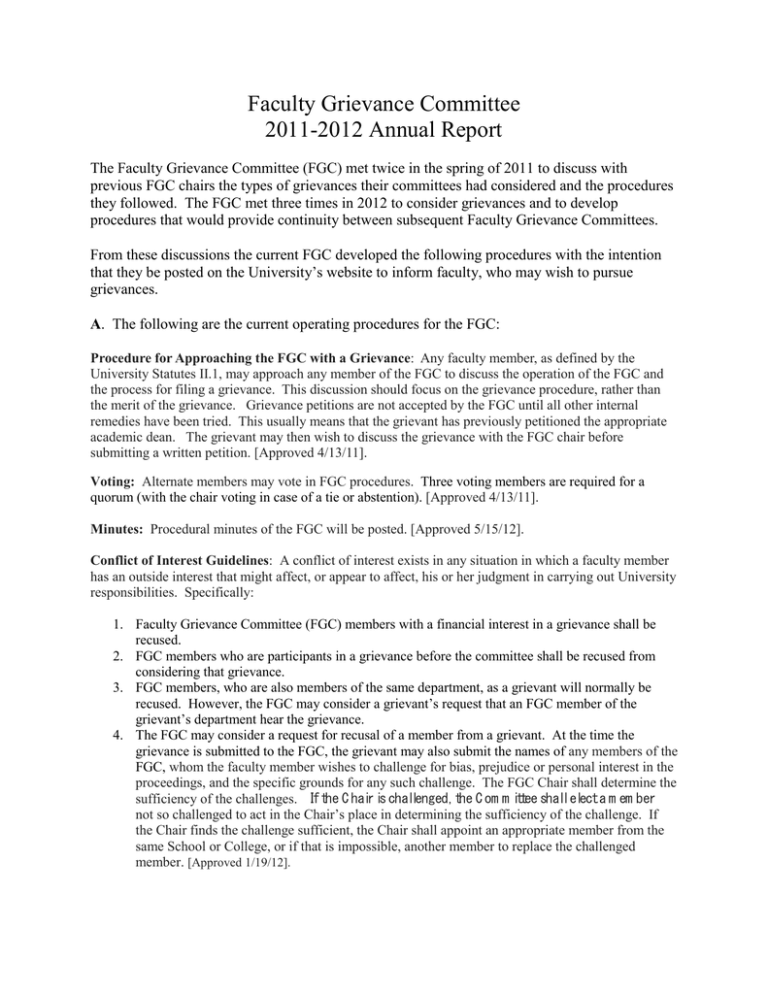
Faculty Grievance Committee 2011-2012 Annual Report The Faculty Grievance Committee (FGC) met twice in the spring of 2011 to discuss with previous FGC chairs the types of grievances their committees had considered and the procedures they followed. The FGC met three times in 2012 to consider grievances and to develop procedures that would provide continuity between subsequent Faculty Grievance Committees. From these discussions the current FGC developed the following procedures with the intention that they be posted on the University’s website to inform faculty, who may wish to pursue grievances. A. The following are the current operating procedures for the FGC: Procedure for Approaching the FGC with a Grievance: Any faculty member, as defined by the University Statutes II.1, may approach any member of the FGC to discuss the operation of the FGC and the process for filing a grievance. This discussion should focus on the grievance procedure, rather than the merit of the grievance. Grievance petitions are not accepted by the FGC until all other internal remedies have been tried. This usually means that the grievant has previously petitioned the appropriate academic dean. The grievant may then wish to discuss the grievance with the FGC chair before submitting a written petition. [Approved 4/13/11]. Voting: Alternate members may vote in FGC procedures. Three voting members are required for a quorum (with the chair voting in case of a tie or abstention). [Approved 4/13/11]. Minutes: Procedural minutes of the FGC will be posted. [Approved 5/15/12]. Conflict of Interest Guidelines: A conflict of interest exists in any situation in which a faculty member has an outside interest that might affect, or appear to affect, his or her judgment in carrying out University responsibilities. Specifically: 1. Faculty Grievance Committee (FGC) members with a financial interest in a grievance shall be recused. 2. FGC members who are participants in a grievance before the committee shall be recused from considering that grievance. 3. FGC members, who are also members of the same department, as a grievant will normally be recused. However, the FGC may consider a grievant’s request that an FGC member of the grievant’s department hear the grievance. 4. The FGC may consider a request for recusal of a member from a grievant. At the time the grievance is submitted to the FGC, the grievant may also submit the names of any members of the FGC, whom the faculty member wishes to challenge for bias, prejudice or personal interest in the proceedings, and the specific grounds for any such challenge. The FGC Chair shall determine the sufficiency of the challenges. If the C hair is challenged,the C om m ittee shallelect a m em ber not so challenged to act in the Chair’s place in determining the sufficiency of the challenge. If the Chair finds the challenge sufficient, the Chair shall appoint an appropriate member from the same School or College, or if that is impossible, another member to replace the challenged member. [Approved 1/19/12]. Post Recommendation. If there is no response after 30 days following the delivery of an FGC recommendation, the FGC chair will write a letter requesting a response as to the status of the action on the recommendation. [Approved 5/15/12.] Continuity. Digital copies of the minutes, procedures and annual reports of the FGC will be passed on between chairs. [Approved 5/15/12.] Annual Reports: FGC will submit an annual report to the faculty in January of each year. The annual report should include: current FGC procedures, a compendium of the number and general nature of grievances filed in the previous year, and their status (declined, pending or the generic recommendation and whether the action of the appropriate administrative official was in accord with the recommendation). Appeals following a recommendation should also be noted. [Approved 1/19/12]. B. The following summarize the grievances considered in 2012 and the recommendations made: Grievances in 2011-12: The FGC considered a grievance from several faculty from the Connell School of Nursing concerning a common compensation issue. The recommendation from the FGC to the Dean of the school and the Provost was in accord with the grievants’ request. A request for consideration of a grievance regarding the conversion of a full-time adjunct position to a tenure track position, thereby terminating a full-time adjunct faculty member, was discussed in some depth as to its impact on academic freedom at the university. The FGC concluded that, while its members would have preferred to consider the grievance, the University Statutes did not provide for the FGC to consider grievances from adjunct or contingent faculty. Appellate Process for Contingent Faculty: The FGC noted both the lack of a grievance procedure for contingent faculty, and the increasing number of contingent part- and full-time faculty, which includes many who are senior in terms of their years of service at BC. The unanimous consensus of the FGC was that the University should adopt a grievance procedure for part- and full-time (adjunct or contingent) faculty. Respectfully submitted to the all the Faculties of Boston College, Michael J. Clarke Chair, University Faculty Grievance Committee May, 2012 Members of the Faculty Grievance Committee 2012 Pamela Grace, CSON Laura Hake, A&S, Biology Marilynn Johnson, A&S, History Ray Madoff, Law Kalpana Seshadri, A&S, English Joseph Tecce, A&S, Psychology Robin Wood, CSON Michael Clarke, A&S, Chemistry
